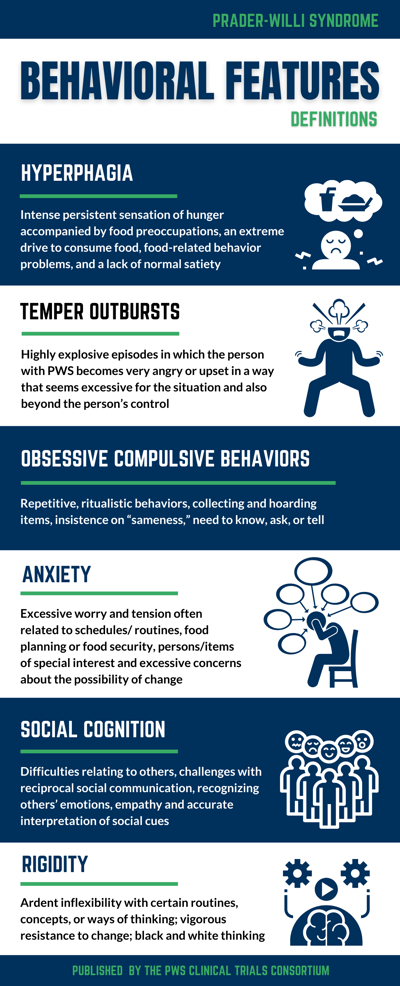As any parent of loved ones with PWS can attest, defining the spectrum of symptoms of PWS can be a challenge! To help solve that problem, a paper has been published that provides consistent descriptions of common PWS–related behaviors. The paper provides consensus definitions of 6 key PWS behaviors. It also includes patient vignettes to illustrate the interrelatedness and impact of these behaviors. More than a dozen international experts in PWS contributed to the effort.
 New Paper Removes a Barrier to PWS Research
New Paper Removes a Barrier to PWS Research
The Behavioral Features in Prader-Willi Syndrome Consensus paper was written by the PWS Clinical Trials Consortium, guided by Dr. Lauren Schwartz. It was published in the Journal of Neurodevelopmental Disorders. Read the full 13-page publication here.
“A limiting factor in finding effective therapies for PWS has been the lack of consensus in the field regarding how to define and measure key PWS behaviors (anxiety, temper outbursts, rigidity),” said clinical psychologist Dr. Schwartz. “With several new potential treatments on the horizon, this paper is very timely and will serve as an important step towards developing meaningful clinical trial protocols that determine the efficacy of potential treatments for challenging PWS behaviors.”
“Based on our conversations with industry and regulatory agencies, there is a clear need for consensus on many terms used to describe the PWS behavioral phenotype,” said Dr. Theresa Strong, Director of Research Programs, FPWR, “We believe this consensus paper will fill that void and ensure that we are all speaking a common language when talking about PWS-associated behaviors.”
The PWS behavior characteristics described in this paper are likely to become future targets of therapeutic interventions. Having a unified understanding of these features is important as we determine which measures to use to determine efficacy in clinical trials.
6 Definitions Provide Further Context to the PWS Behavioral Profile
The published paper includes the following definitions:
Hyperphagia: intense persistent sensation of hunger accompanied by food preoccupations, an extreme drive to consume food, food-related behavior problems, and a lack of normal satiety
Temper outbursts: highly explosive episodes in which the person with PWS becomes very angry or upset in a way that seems excessive for the situation and also beyond the person’s control
Anxiety: excessive worry and tension often related to schedules/ routines, food planning or food security, persons/items of special interest and excessive concerns about the possibility of change
Obsessive compulsive behaviors: repetitive, ritualistic behaviors, collecting and hoarding items, insistence on “sameness,” need to know, ask, or tell
Rigidity: ardent inflexibility with certain routines, concepts, or ways of thinking; vigorous resistance to change; black and white thinking
Social cognition: difficulties relating to others, challenges with reciprocal social communication, recognizing others’ emotions, empathy and accurate interpretation of social cues.
The Behavioral Features in Prader-Willi Syndrome Consensus paper is published in the Journal of Neurodevelopmental Disorders. Read the full 13-page publication here.







